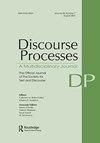How literary text reading is influenced by narrative voice and focalization: evidence from eye movements
IF 2.1
2区 心理学
Q2 PSYCHOLOGY, EDUCATIONAL
引用次数: 0
Abstract
ABSTRACTA fictional story is always narrated from a certain narrative voice and mode of focalization. These core narrative techniques have a major impact on how readers interpret the narrative plot and connect with the characters. This study used eye-tracking to investigate how classic narrative reading is affected by narrative voice and focalization. The results showed that the third-person narrative voice was read more slowly than the first-person narrative voice, especially when the narrative was presented with internal focalization. Importantly, the transition from a first-person to a third-person narrative voice generally resulted in longer reading times, whereas a switch from a third-person to a first-person narrative voice only yielded limited benefits in terms of reduced reading time. These findings provide direct evidence to support the assumption that there is a distinction between the first-person narration and the third-person narration and demonstrate the important role of narrative voice and focalization in understanding narrative texts. AcknowledgmentsWe are grateful to Professor Jie Zhang for his invaluable support in conducting this study. We are also grateful to Tianyue Wang and Yiyi Lu for their assistance in collecting and analyzing the data. We are thankful to the reviewer for prompting us to consider this important question.Disclosure statementNo potential conflict of interest was reported by the author(s).Additional informationFundingThis study was supported by the Jiangsu Social Science Fund (Grant No. [23YYB010]), the Grand for the Social Science Foundation of the Higher Education Institutions of Jiangsu Province (Grant No. [2021SJA0086]), the High-quality Research Project on the Application of Social Science in Jiangsu Province (Grant No. [22SWB-17]), and the National Social Science Foundation of China (Key Program: Grant No. [18AYY010]; Major Program: Grant No. [21&ZD288]).文学文本阅读如何受到叙事声音和聚焦的影响:来自眼球运动的证据
摘要小说故事总是以一定的叙事声音和聚焦方式进行叙述。这些核心叙事技巧对读者如何解读叙事情节以及与人物的联系有着重要的影响。本研究采用眼动追踪的方法研究了叙事声音和聚焦对经典叙事阅读的影响。结果表明,第三人称叙事语态的阅读速度比第一人称叙事语态慢,尤其是当叙事呈现内部聚焦时。重要的是,从第一人称到第三人称叙事的转换通常会导致更长的阅读时间,而从第三人称到第一人称叙事的转换只会在减少阅读时间方面产生有限的好处。这些发现为第一人称叙述和第三人称叙述之间存在区别的假设提供了直接证据,并证明了叙事声音和聚焦在理解叙事文本中的重要作用。我们非常感谢张杰教授在本研究中给予的宝贵支持。我们也非常感谢王天悦和陆依依对数据收集和分析的协助。我们感谢审稿人促使我们考虑这个重要的问题。披露声明作者未报告潜在的利益冲突。本研究由江苏省社会科学基金资助(批准号:No. 8226)。[23 yyb010]),大的社会科学基金会江苏省高等教育机构(批准号[2021SJA0086]),江苏省社会科学应用高质量研究项目(批准号:2018102@qq.com);[22 swb-17]),中国国家社会科学基金(主要项目:批准号(18 ayy010);重大项目:批准号:[21 &zd288])。
本文章由计算机程序翻译,如有差异,请以英文原文为准。
求助全文
约1分钟内获得全文
求助全文
来源期刊

Discourse Processes
Multiple-
CiteScore
4.30
自引率
4.50%
发文量
27
期刊介绍:
Discourse Processes is a multidisciplinary journal providing a forum for cross-fertilization of ideas from diverse disciplines sharing a common interest in discourse--prose comprehension and recall, dialogue analysis, text grammar construction, computer simulation of natural language, cross-cultural comparisons of communicative competence, or related topics. The problems posed by multisentence contexts and the methods required to investigate them, although not always unique to discourse, are sufficiently distinct so as to require an organized mode of scientific interaction made possible through the journal.
 求助内容:
求助内容: 应助结果提醒方式:
应助结果提醒方式:


